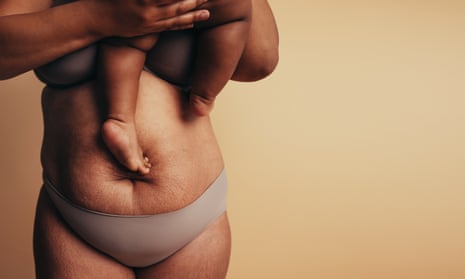Post-pregnancy body positivity? On Instagram, it’s hard to find
After analysing 600 images tagged #postpartumbody on Instagram, Australian researchers found stretch marks, bellies and scars were rarely in the picture

Stretch marks, abdominal fat, caesarean scars. This is the reality for many new mothers, but you’d think otherwise from scrolling social media, according to a new Australian study.
Researchers examined 600 Instagram images with the hashtag #postpartumbody and found that only 5% of images focused on bodies bearing stretch marks, cellulite, sagging breasts or scars.
Looking at images from the “recent” and “top” posts categories, 91% of images portrayed lean or average-weight women, often dressed in activewear. These images were also likely to be digitally enhanced and carefully curated by users.
The results, published in Healthcare, are surprising, says lead researcher Dr Megan Gow, a dietician and senior lecturer at University of Sydney and Westmead Children’s hospital. “The overwhelming thing we felt when we were looking at these images is they weren’t really representative of your typical woman during the early postpartum period.”
Gow says the findings are concerning. “It just puts an increased level of pressure on women who are already going through such a huge life change,” says Gow. These images may trigger feelings of body dissatisfaction in new mothers, she says, and perhaps lead to more serious mental health issues such as postnatal depression and anxiety.
“They’re thinking about feeding their infant, they’re probably sleep-deprived … And then on top of that they look at Instagram and think: ‘Oh, my God, I also need to be super fit, I need to be thin’.”
Mental health service Panda (Perinatal Anxiety and Depression Australia) runs the country’s only national helpline for families experiencing perinatal anxiety and depression. Chief executive officer Julie Borninkhof says the organisation fields calls from new parents “who are struggling to find a way to juggle having a shower each day”.
She agrees exposure to highly stylised images on social media can make matters worse. “More than anything it places that self-critique [on the individual] and increases the individual’s stress. They need to feel their experience of vulnerability is normal, and that parenting for anyone has its ups and downs.”
“Some days that looks glossy and shiny and for the majority of others it’s going to look really awful, and that’s OK,” Borninkhof says.
Not only were the images Gow and her team analysed an inaccurate representation of the postpartum population; they found little evidence of the movement towards body positivity seen elsewhere on social media.
READ RELATED: Model reveals how becoming a mechanic while flaunting her girly side led to sexual assault
As an example, Gow notes the hashtag #curvyyoga, which portrays a diversity of body shapes and sizes, suggesting that yoga is an inclusive activity and community.
With #pospartumbody, however, “we saw very few images of women with abdominal fat or stretch marks, or the pot belly that hangs around for a few months after you’ve had a baby. We were expecting to see more of that – more pride over the postpartum body,” she says.
Encouraging new mothers to love their bodies can be a form of pressure too, says Katherine Saunders. The Sydney-based clinical psychologist, and mother to a nine-month-old daughter, would prefer to see more body neutrality in the new motherhood discourse.
With stretch marks, for example: “Some people talk about those as battle wounds or evidence their baby grew big and strong. And I love that … But not everyone’s going to feel that way,” she says.
“Society’s really done a number on women … in relation to our bodies. There doesn’t need to be this extra task of loving those changes when historically, perhaps we haven’t anyway.”
Julie Freeman, a Sydney-based fitness coach, Panda volunteer and mother to a three-year-old, agrees.
She doesn’t see a need to “celebrate” the postpartum body on social media, but says there is an opportunity to use social platforms to explore new mothers’ health more holistically. “How are you feeling day to day? How are you recovering from birth? Are you well, are you not well, do you feel you need more support? There are things beyond the body that tell a bigger story.”
Gow says there are limited studies on social media and postpartum women. It’s a significant gap in research, as women of reproductive age are among the highest users of Instagram.
Her study calls for more research to examine the effectiveness of social media in conveying public health messaging on diet, exercise and psychological wellbeing.
For now, to combat the potentially harmful effects of #pospartumbody images, Borninkhof says new mothers should trust their instincts. “If you engage with an image that doesn’t resonate with you or makes you feel in any way inferior … move on.”
“The power of the unfollow button on social media, especially Instagram, is a wonderful thing.”
Source: Health & wellbeing | The Guardian





